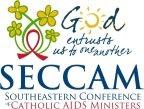
Magic Johnson addresses National HIV Prevention Conference
Being face of disease both blessing and curse, former NBA star says
From an article by DYANA BAGBY, Southern Voice | Aug 24 2009
Former NBA star Earvin “Magic” Johnson wowed hundreds of attendees Sunday at the opening plenary of the 2009 HIV Prevention Conference in Atlanta, as he spoke frankly about being HIV positive for nearly 20 years.
“They said I wouldn’t be here, but last Friday I celebrated my 50th birthday,” said Johnson, who announced he was HIV positive in November 1991.
“A lot has changed since I announced. We now have a major problem in urban American, in inner cities — the face of AIDS has changed from a gay white man’s disease to a black and Latino disease. And if we don’t get the black church involved, there is no way we can bring these numbers [of new HIV cases] down," he said.
Johnson, who played with the Los Angeles Lakers and helped carry the team to five championships, walked among the crowd in the Centennial Ball Room of the Hyatt Regency in downtown Atlanta as he spoke, shaking hands with attendees as well as stopping to pose for pictures.
After announcing he was HIV positive, Johnson founded the Magic Johnson Foundation to combat the spread of HIV and educate people about safer sex. He has said he is not gay but contracted the disease through having numerous sexual partners during his NBA career.
His foundation is working to partner with black churches, he said Sunday, because African Americans are disproportionately impacted by the disease.
According to a 2006 report from the Centers for Disease Control & Prevention, a sponsor of the conference, while African Americans make up 12 percent of the U.S. population, blacks account for 45 percent of new infections and 46 percent of those living with HIV. Also, gay and bisexual black men accounted for 63 percent of new infections among black men in 2006, the CDC reported.
“We have talked to pastors to get involved in any way,” Johnson said to cheers from the crowd.
Churches can be involved, for example, by using their vans and buses to transport those with HIV/AIDS to doctors’ appointments and pharmacies to pick up their medication. Johnson said pastors are also being asked to get in the pulpit and tell their congregations to get tested for HIV — and then go back and get the results.
“We all have to get black churches involved. If we do, we will see change quickly,” Johnson said. “One constant in the black community is the church.”
Johnson said young black gay men are also at serious risk.
“Now young black gay men are more open than before, they are more accepted by their peers. In Atlanta, you see a lot of that,” he said. “That was never accepted when I grew up. We need to teach them about safe sex and tell them what can happen — because when you’re young, you think you are invincible.”
Johnson also acknowledged him being HIV positive has been good for the movement to stop the spread of HIV by being able to raise awareness, but it also has been a “curse.”
“Because people can say, well, if I get HIV, I can be like Magic,” he said. "But there is also someone dying from AIDS every day in the U.S. On our historically black college campuses, numbers are rising. We have to get the sororities and fraternities involved. This is so, so important.
“I love being the face of the disease, but I have not enjoyed where we are headed. We still have numbers that are not far down enough."
More than 3,000 public health, medical and AIDS community leaders are in Atlanta through Aug. 26 for the National HIV Prevention Conference.
“This conference is a reminder that HIV prevention can and does save lives,” said Kevin Fenton in a statement.
Fenton is the conference co-chair and director of CDC’s National Center for HIV/AIDS, Viral Hepatitis, STD & TB Prevention. “However, the HIV crisis is far from over. Too many people remain at risk, and too few people have access to proven HIV prevention programs.”
More than 1 million people in the U.S. are living with HIV and the CDC estimates more than 56,000 Americans contract the disease each year — that’s one person every nine and a half minutes. Gay and bisexual men of all races as well as African Americans and Latinos are most severely impacted by HIV.





No comments:
Post a Comment
Note: Only a member of this blog may post a comment.